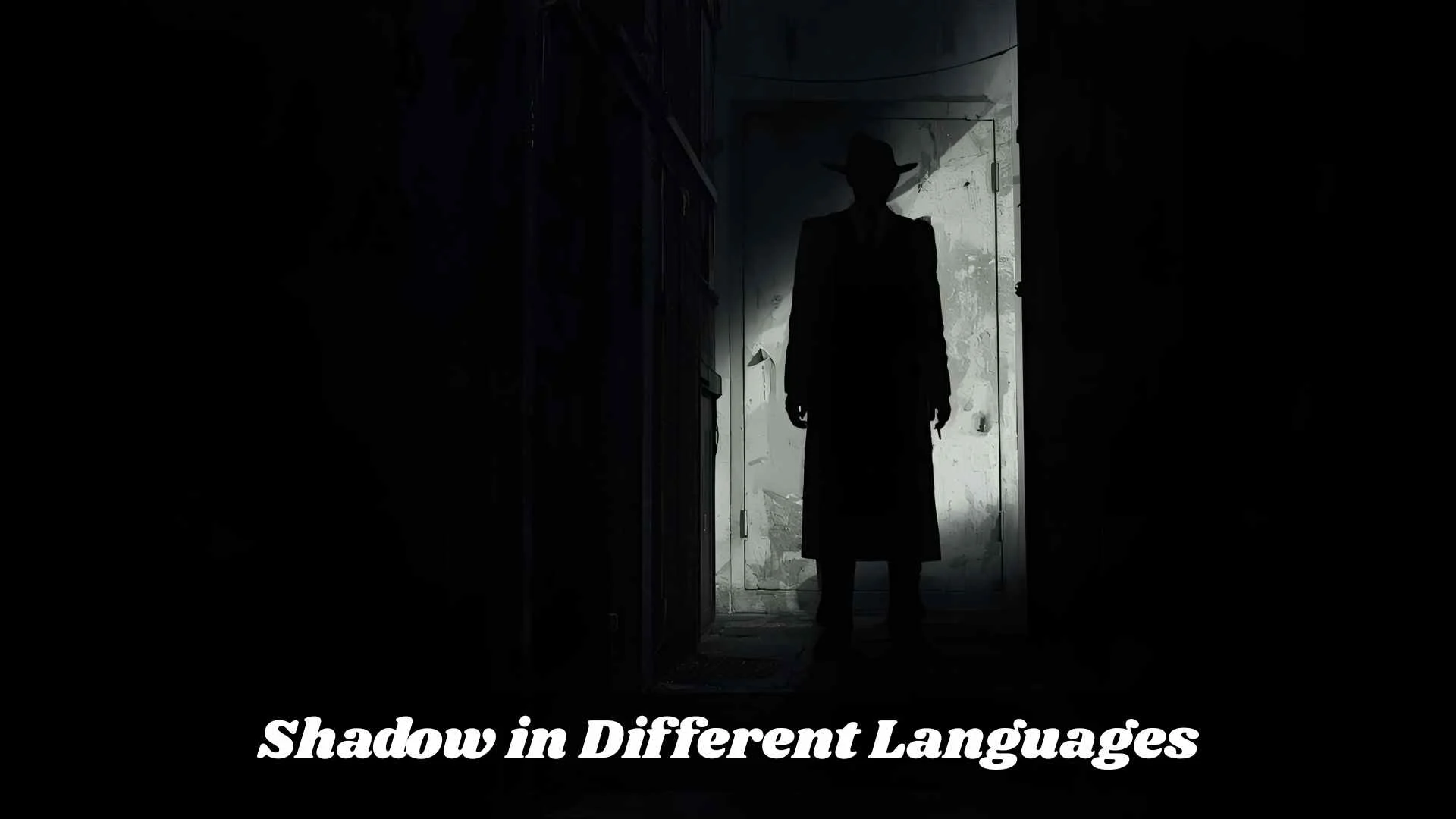Have you ever stopped to notice your shadow following you — silent, constant, and always there?
The idea of a shadow has fascinated people for centuries, inspiring art, stories, and even spiritual meanings.
In this article, we’ll explore Shadow in Different Languages, uncovering how cultures across the world describe this mysterious and beautiful companion that moves wherever we go.
This guide is written just for you — the curious mind who loves discovering how words connect us beyond borders.
As you read, you’ll find how the word shadow changes in sound and meaning across languages, yet always carries that same sense of quiet presence and wonder.
By the end, you’ll see how something as simple as a shadow can reveal the deep poetry hidden in every language.
🌐 How to Say “Shadow” in 70 Different Languages
- English (🇬🇧) – Shadow | Pronunciation: SHA-doh
Example: The tree cast a long shadow. - Spanish (🇪🇸) – Sombra | Pronunciation: SOM-brah
Example: La sombra del árbol era fresca. (The tree’s shadow was cool.) - French (🇫🇷) – Ombre | Pronunciation: OMBR
Example: L’ombre cachait le secret. (The shadow hid the secret.) - German (🇩🇪) – Schatten | Pronunciation: SHA-tuhn
Example: Der Schatten fiel auf den Boden. (The shadow fell on the ground.) - Italian (🇮🇹) – Ombra | Pronunciation: OHM-brah
Example: L’ombra dell’edificio era lunga. (The building’s shadow was long.) - Portuguese (🇵🇹) – Sombra | Pronunciation: SOM-brah
Example: A sombra da árvore é refrescante. (The tree’s shadow is refreshing.) - Russian (🇷🇺) – Тень (Ten’) | Pronunciation: tyen
Example: Тень исчезла с восходом солнца. (The shadow disappeared at sunrise.) - Chinese (Mandarin) (🇨🇳) – 影子 (Yǐngzi) | Pronunciation: yeeng-dzuh
Example: 影子在墙上跳动。 (The shadow danced on the wall.) - Japanese (🇯🇵) – 影 (Kage) | Pronunciation: kah-geh
Example: 月の影が静かに揺れている。 (The moon’s shadow is gently swaying.) - Korean (🇰🇷) – 그림자 (Geurimja) | Pronunciation: guh-reem-jah
Example: 그의 그림자가 벽에 보였다. (His shadow appeared on the wall.) - Arabic (🇸🇦) – ظل (Zill) | Pronunciation: zil
Example: الظل يرافقنا دائمًا. (The shadow always follows us.) - Hindi (🇮🇳) – छाया (Chhāyā) | Pronunciation: chaa-YAA
Example: पेड़ की छाया में ठंडक थी। (There was coolness under the tree’s shadow.) - Urdu (🇵🇰) – سایہ (Saya) | Pronunciation: sa-ya
Example: درخت کا سایہ بہت ٹھنڈا تھا۔ (The tree’s shadow was very cool.) - Turkish (🇹🇷) – Gölge | Pronunciation: GUEL-geh
Example: Gölge duvara yansıdı. (The shadow reflected on the wall.) - Greek (🇬🇷) – Σκιά (Skiá) | Pronunciation: skee-AH
Example: Η σκιά κινήθηκε απαλά. (The shadow moved gently.) - Hebrew (🇮🇱) – צֵל (Tsel) | Pronunciation: tsel
Example: הצל נעלם עם השמש. (The shadow vanished with the sun.) - Thai (🇹🇭) – เงา (Ngao) | Pronunciation: ngao
Example: เงาของเขาปรากฏบนพื้น. (His shadow appeared on the ground.) - Vietnamese (🇻🇳) – Bóng | Pronunciation: bawng
Example: Bóng của cây dài ra khi mặt trời lặn. (The tree’s shadow grew long at sunset.) - Swahili (🇰🇪) – Kivuli | Pronunciation: kee-VOO-lee
Example: Kivuli cha mti kilikuwa baridi. (The tree’s shadow was cool.) - Zulu (🇿🇦) – Isithunzi | Pronunciation: ee-see-THOON-zee
Example: Isithunzi somuthi sasibanda. (The shadow of the tree was cool.) - Polish (🇵🇱) – Cień | Pronunciation: chyen
Example: Cień drzewa dawał ochłodę. (The tree’s shadow gave coolness.) - Dutch (🇳🇱) – Schaduw | Pronunciation: SKAH-dow
Example: De schaduw van de wolk bewoog snel. (The cloud’s shadow moved fast.) - Swedish (🇸🇪) – Skugga | Pronunciation: SKOO-gah
Example: Skuggan föll på marken. (The shadow fell on the ground.) - Finnish (🇫🇮) – Varjo | Pronunciation: VAR-yo
Example: Varjo liikkui hiljaa. (The shadow moved quietly.) - Hungarian (🇭🇺) – Árnyék | Pronunciation: AHR-nyake
Example: A fa árnyéka hűvös volt. (The tree’s shadow was cool.) - Czech (🇨🇿) – Stín | Pronunciation: steen
Example: Strom vrhal dlouhý stín. (The tree cast a long shadow.) - Romanian (🇷🇴) – Umbra | Pronunciation: OOM-brah
Example: Umbra dispărea încet. (The shadow slowly faded.) - Ukrainian (🇺🇦) – Тінь (Tin’) | Pronunciation: teen
Example: Тінь впала на підлогу. (The shadow fell on the floor.) - Persian (🇮🇷) – سایه (Sāyeh) | Pronunciation: sah-yeh
Example: سایه آرام بر دیوار افتاد. (The shadow gently fell on the wall.) - Malay (🇲🇾) – Bayang | Pronunciation: bah-yang
Example: Bayang itu muncul di tanah. (The shadow appeared on the ground.) - Indonesian (🇮🇩) – Bayangan | Pronunciation: bah-YANG-an
Example: Bayangan pohon terlihat panjang. (The tree’s shadow looked long.) - Filipino (🇵🇭) – Anino | Pronunciation: ah-NEE-no
Example: Ang anino niya ay lumitaw sa pader. (His shadow appeared on the wall.) - Danish (🇩🇰) – Skygge | Pronunciation: SKU-geh
Example: Skyggen bevægede sig stille. (The shadow moved quietly.) - Norwegian (🇳🇴) – Skygge | Pronunciation: SHU-geh
Example: Skyggen falt over gulvet. (The shadow fell over the floor.) - Slovak (🇸🇰) – Tieň | Pronunciation: tyen
Example: Tieň padol na zem. (The shadow fell to the ground.) - Slovenian (🇸🇮) – Senca | Pronunciation: SEN-tsa
Example: Senca drevesa je bila dolga. (The tree’s shadow was long.) - Bulgarian (🇧🇬) – Сянка (Syanka) | Pronunciation: SYAN-kah
Example: Сянката му изчезна. (His shadow disappeared.) - Croatian (🇭🇷) – Sjena | Pronunciation: SYEH-nah
Example: Sjena je pala na cestu. (The shadow fell on the road.) - Serbian (🇷🇸) – Сенка (Senka) | Pronunciation: SEN-kah
Example: Сенка дрвета је дуга. (The tree’s shadow is long.) - Bosnian (🇧🇦) – Sjena | Pronunciation: SYEH-nah
Example: Sjena zida se pomicala. (The wall’s shadow was moving.) - Estonian (🇪🇪) – Vari | Pronunciation: VAH-ree
Example: Vari liikus aeglaselt. (The shadow moved slowly.) - Latvian (🇱🇻) – Ēna | Pronunciation: EH-nah
Example: Ēna krita uz sienas. (The shadow fell on the wall.) - Lithuanian (🇱🇹) – Šešėlis | Pronunciation: sheh-SHEH-lees
Example: Šešėlis dingo su saule. (The shadow vanished with the sun.) - Maltese (🇲🇹) – Dell | Pronunciation: dell
Example: Id-dell tal-bniedem deher fuq il-ħajt. (The man’s shadow appeared on the wall.) - Icelandic (🇮🇸) – Skuggi | Pronunciation: SKOO-gee
Example: Skuggi trjáins var langur. (The tree’s shadow was long.) - Irish (🇮🇪) – Scáth | Pronunciation: skaw
Example: Bhí scáth an duine le feiceáil ar an mballa. (The person’s shadow was seen on the wall.) - Welsh (🏴) – Cysgod | Pronunciation: KUS-god
Example: Roedd y cysgod ar y llawr. (The shadow was on the floor.) - Hawaiian (🇺🇸) – Aka | Pronunciation: AH-kah
Example: ʻIke au i kou aka. (I see your shadow.) - Maori (🇳🇿) – Āta | Pronunciation: ah-tah
Example: Ka kitea te āta i te rā. (The shadow is seen in the sun.) - Afrikaans (🇿🇦) – Skaduwee | Pronunciation: SKAH-doo-wee
Example: Die skaduwee val lank. (The shadow falls long.) - Amharic (🇪🇹) – ጥላ (T’ila) | Pronunciation: tih-lah
Example: የዛፉ ጥላ ቀዝቃዛ ነው። (The tree’s shadow is cool.) - Bengali (🇧🇩) – ছায়া (Chhaya) | Pronunciation: chha-ya
Example: গাছের ছায়া ঠান্ডা লাগে। (The tree’s shadow feels cool.) - Tamil (🇮🇳) – நிழல் (Nizhal) | Pronunciation: ni-zhal
Example: மரத்தின் நிழல் குளிர்ச்சியாக இருந்தது. (The tree’s shadow was cool.) - Telugu (🇮🇳) – నీడ (Needa) | Pronunciation: nee-dah
Example: చెట్టు నీడ చల్లగా ఉంది. (The tree’s shadow is cool.) - Kannada (🇮🇳) – ನೆರಳು (Neralu) | Pronunciation: neh-rah-loo
Example: ಮರದ ನೆರಳು ತಂಪಾಗಿತ್ತು. (The tree’s shadow was cool.) - Malayalam (🇮🇳) – നിഴൽ (Nizhal) | Pronunciation: ni-zhal
Example: മരത്തിന്റെ നിഴൽ തണുപ്പാണ്. (The tree’s shadow is cool.) - Gujarati (🇮🇳) – છાયો (Chhayo) | Pronunciation: chha-yo
Example: વૃક્ષનો છાયો ઠંડો છે. (The tree’s shadow is cool.) - Marathi (🇮🇳) – सावली (Savli) | Pronunciation: saav-lee
Example: झाडाची सावली थंड होती. (The tree’s shadow was cool.) - Punjabi (🇮🇳/🇵🇰) – ਛਾਂ (Chhaan) | Pronunciation: chhaan
Example: ਦਰੱਖਤ ਦੀ ਛਾਂ ਠੰਡੀ ਸੀ। (The tree’s shadow was cool.) - Nepali (🇳🇵) – छाया (Chhāyā) | Pronunciation: chaa-ya
Example: रुखको छाया चिसो थियो। (The tree’s shadow was cool.) - Sinhala (🇱🇰) – සැලැස්ම (Saluva) | Pronunciation: sa-loo-va
Example: ගසක සෙවණ සීතලයි. (The tree’s shadow is cool.) - Mongolian (🇲🇳) – Сүүдэр (Süüder) | Pronunciation: soo-der
Example: Модны сүүдэр сэрүүн байна. (The tree’s shadow is cool.)
🌒 Conclusion
Every language captures the essence of shadow in its own poetic way — from “sombra” to “kage” to “chhaya.” Shadows remind us that light and darkness coexist beautifully. Whether it’s comfort under a tree or mystery on the wall, a shadow always tells a quiet story.

John Preston is a passionate American author known for his insightful storytelling and thought-provoking narratives. With a deep love for literature and a sharp eye for detail, John crafts stories that not only entertain but also inspire reflection and growth. His modern writing style, combined with relatable characters and real-life settings, has earned him a loyal readership across diverse audiences.
Dedicated to exploring human emotions, relationships, and societal challenges, John brings authenticity and depth to every page he writes. When he’s not working on his next manuscript, you can find him in his cozy office, surrounded by books, a warm cup of coffee by his side, and his laptop always within reach.
Some of his most notable works include:
The Silent Echoes
Chasing the Dawn
Beneath the City Lights
Through his writing, John Preston continues to leave a lasting impact, one story at a time.

